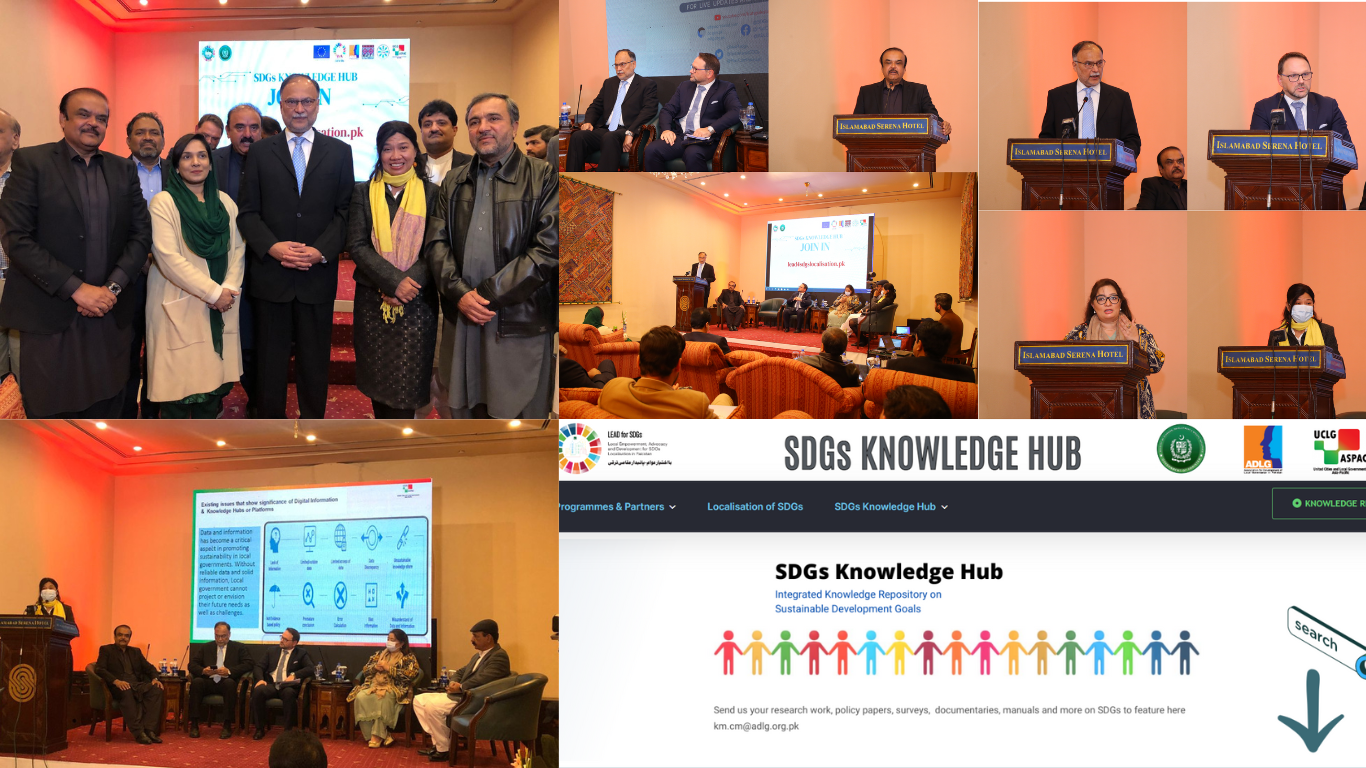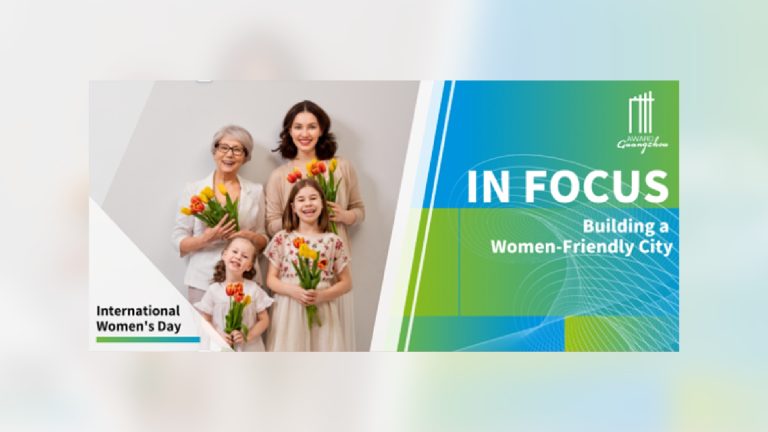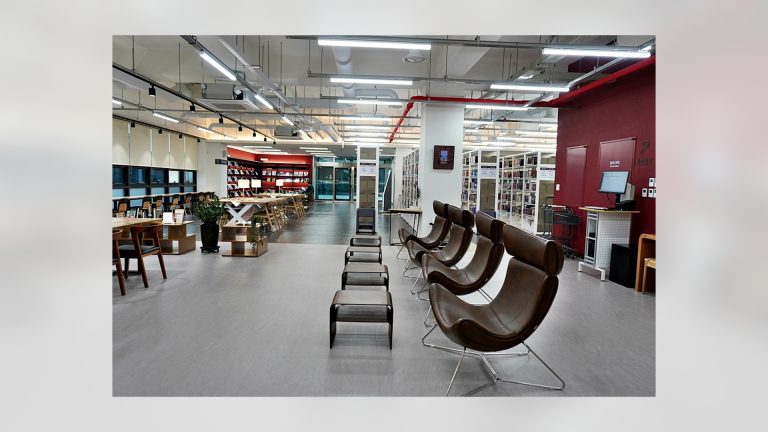LEAD – Local Empowerment, Advocacy and Development for SDGs Localization Program, a project supported by Delegation of the European Union and the United Cities and Local Governments, Asia Pacific (UCLG ASPAC) partners with the Federal Ministry of Planning Development and Special Initiatives (MoPD&SI) Government of Pakistan to establish SDGs Knowledge Hub (SKH) at the Federal Secretariat of the Ministry.
In January 2023, the National Parliamentary Task Force on SDGs and LEAD jointly launched this knowledge hub. The Federal Minister for Planning Development & Special Initiatives (PD&SI) formally launched the (SKH), and inaugurated the digital up linking the hub.
The ceremony was graced with notable dignitaries including Ms. Romina Khursheed Alam, Convener, National Parliamentary Taskforce on SDGs, Mr. Ovidiu MIC, Head of Cooperation, the Delegation of the European Union to Pakistan, Ms. Bernadia [rawati Tjandradewi, Secretary General, UCLG ASPAC, Mr. Mian Rajan Sultan Pirzada President, ADLG and other prominent stakeholders.
This Knowledge Hub will serve as a digital resource to the repository of the information and knowledge which relevant to the localisation of SDGs in Pakistan and will offer easy and fast track access to the locally generated voluntary reviews of SDGs and major reports offering data on the local development in Pakistan. The KH will offer access to the knowledge and International best practices, those are useful for the local level planning and impact monitoring for service delivery.
Background of SDGs Knowledge Hub
LEAD for SDGs Programme aiming to contribute in the localization and achievement of SDGs in Pakistan, has been endeavoring since 2019 to foster an enabling environment for mainstreaming SDGs in local development process. One of the impactful expected results that LEAD has been trying to achieve is “Improved knowledge and information around SDGs” . In order to deliver this results, a highly impactful and lasting activity for collection, presenting and disseminating the information and knowledge for localizing SDGs, and Knowledge Hub (SKH) was established in collaboration with Ministry of Planning Development and Special Initiatives during 2022.
The Ministry is chosen to be the host of this knowledge hub for the purpose of sustainability and mainstreaming. This hub will offer easy access to the tailor-made information and knowledge products for various stakeholders working on SDGs achievement.
SKH would serve as a central repository of trusted information, a platform capable of nurturing the sustained acquisition of SDGs knowledge beyond the LEAD for SDGs project. It will offer a great benefit to development practitioners, policy, and decision-makers and will serve as a great tool for local level monitoring of service delivery by the Local Government.
LEAD for SDGs project will accommodate and embed all the reliable knowledge and information relevant to the localisation of SDGs in Pakistan and at the global level in SKH. The LEAD project will continue with the search engine optimization and keep the SKH updated in terms of user interface, and experience to enhance web traffic. Upon the project phase out, the intellectual and technological rights of the SKH will be transferred to the Ministry for sustainable management and utilization of the hub.
National Launching of Exclusive Knowledge Hub on SDGs (SKH)
LEAD – Local Empowerment, Advocacy and Development for SDGs Localization Program, and the National Parliamentary Task Force on SDGs (NPTF-SDGs) jointly organized the national launch of the Exclusive Knowledge Hub on SDGs (SKH) on January 26, 2023 at
Islamabad. The event was supported by the Delegation of the European Union and the United Cities and Local Governments, Asia Pacific (UCLG ASPAC). The SDGs unit at the Federal Ministry of Planning Development and Special Initiatives (MoPD&SI) Government of Pakistan formally the host of the Knowledge Hub was the major lead for the launching ceremony as the hub is established at the Federal Secretariat of the Ministry, and ultimately will be owned by the ministry as one of the mainstream sub-sections of the SDGs unit. The Launching Ceremony was attended by the highest level of the National Government in Pakistan, the representatives of the Provincial Governments, and most importantly the representatives from the Local Governments across Pakistan including Sind and Blochistan. The EU in Pakistan has a particular focus in the provinces of Sind and Balochsitan to address poverty, climate change and local level development agenda to achieve SDGs.
Mr. Ovidiu MIC, Head of Cooperation, Delegation of the European Union to Pakistan

EU delegation graced the occasion to complement the effort for launching SKH. Mr. Ovidiu emphasized that since 2013, EU after the adaption of Communication for Local Authorities as a core. policy undertaking has been focusing to work with the local authorities in different parts of the world especially the underdeveloped countries, most of EU cooperation is targeted at the local level development and partnership with the local authorities.
Under the recent Strategic Engagement Plan (SEP) of 2019, with Pakistan EU is committed to support the initiatives those are targeted for the achievement of Sustainable Development Goals through local level development particularly in Balochistan and Sindh as the priority Provinces.
EU under one of its main principal’s SUBSIDIARITY envisions that the local governments shall be capable to act as decision makers in shaping up the important policy making and service delivery at the local levels which off course is critical for achieving the global agenda for SDGs. In Pakistan, as you are all considerate about the fact that local governments face challenges and are constrained to play a role in the local level development despite the number of efforts by the central government to decentralize the powers.
“Local Empowerment, Advocacy and Devel opment for SDGs Localisation (LEAD), has been one of EU’ s contributions to work with the local level actors to meaningfully participate in the achievement of SDGs through the development of capacity for Local Governments in Sind and Balochistan. Mr. Mic considered that the knowledge hub will offer a bench mark support for the local government to adapt the approach for generating and utilizing the knowledge and information for the achievement of SDGs Agenda.
Mr. Mian Rajan Sultan Pirzada, Association for the Development of Local Governments.

The president of ADLG, the executant of the LEAD project formally welcomed the guests at the event and introduced the the idea of setting up Knowledge Hub at the Ministry for a sustainable mechanism for mainstreaming SDGs agenda for localisation in Pakistan.
Mr. Sultan envisions a great impact of this Knowledge Hub, and considers that this will serve as a central repository of evidence based locally generated knowledge, information and may offer tools for developing the local voluntary reviews of SDGs through local government’s leadership.
This is one of the great progress for strengthening local governance in Pakistan and for the Local Government Association of Pakistan, this initiative off course is a great milestone to help plan and execute local level development projects with the evidence based information and digital monitoring resource.
Ms. Romina Khurhsid Aalam, Special Assistant to the Prime Minster of Pakistan Convener SDGs Parliamentary Task Force in Pakistan.

The National Parliamentary Task Force is tasked with overseeing the achievement of SDGs goals in Pakistan, but it has always been interested in addressing the need for research, data, and institutionalising Taskforce efforts. Ms. Aalam emphasises and considers the establishment of the Knowledge Hub as a reflection of the Government of Pakistan’s commitment to the 2030 Agenda of Sustainable Development Goals.
Setting up of this Knowledge Hub is not merely another data repository, but it is the new road map that, how do we build the capacity of local governments to collect evidence base information which is locally tested and analyzed through the grass root level indigenous wisdom and collated and represented at the Knowledge Hub for a sustainable planning, monitoring and evaluation of service delivery to the constituents at the local Governments’ level.
The Localization, or the local dimension of the SDGs means that municipalities and cities are not merely implementing agencies, but that their challenges and opportunities in achieving the SDGs deserve special recognition. The commitment of Pakistan Government to achieve Sustainable Development Goals by 2030 also demands that LG system is established and empowered because more than 60% of the goals fal] within the domain of the local government. If you look at the SDGs Goals the list includes a specific urban goal, SDG 11. The Goal calls for making cities and human settlements inclusive, safe, resilient and sustainable, recognising the key role of cities for sustainable development. Although this SDG 11 is directly linked to measure the progress within the domain of city governments, but almost 2/3 of the total 232 Targets of SDGS indicators cannot be measured and tracked without the involvement of local and city Governments. In fact, 65 percent of the SDG agenda may not be fully achieved without the involvement of urban and local actors.
Ms. Aalam appreciated EU-funded LEAD project and will expect that EU continues its support for building the capacity of Local Governments and also offer their technical expertise to make this knowledge hub a practical resource of information and knowledge for better planning. The National Parliamentary Task Force considers that there a great potential in this knowledge hub to develop the nexus of Voluntary National Review of SDGs and may offer a great data for present the National Level Progress.
The Launch Prof. Ahsan Iqbal, PhD, Minister for Planning Development and Special Initiatives (MoPD&SI)

The Minister has been extremely pleased to formally launch the SDG Knowledge Hub, as he is the strong believer of utilizing information and knowledge for setting the vision and plans. The Minister referenced the Vision 2025, which was developed under his leadership and it offered almost the similar frame of targets which later on surfaced as the global commitment in the shape of SDGs. Ministry of Planning Development and Special Initiatives, has been a strong advocate for setting up the commitment by the state, during his previous tenure of 2013-2018.
Prof. Iqbal, considers the use of evidence paramount for any planning he considers this Knowledge Hub will create tools and mechanism for providing access to evidence- based information, and knowledge to measure the performance of our development planning and execution of projects at the local levels in Pakistan. Ministry under his leadership is quite proactive to develop the mechanism for generating, collating and effectively utilizing the information for sustainable planning, monitoring and evaluation of the Government’s progress.
During the PMLN Government (2013-18), Pakistan was among the first countries to endorsed the 2030 Agenda for Sustainable Development right after September 2015 SDG Summit. Following our global commitment, on 16th February 2016, the Parliament unanimously approved the Sustainable Development Goals (SDGs) as the national development agenda. Pakistan also formed the Parliamentary SDGs Secretariat based at the National Assembly, one of the few countries to do so.
This process of legislation was the first and crucial step in mainstreaming and localizing the SDGs The process of localizing the SDGs in Pakistan is more than just agreeing to formal arrangements with government partners. It off course calls for an inclusive process to rely on on evidence based solutions to transform abstract SDG aspirations into real and objective targets for all stakeholders, including local actors.
Now that the SDGs Knowledge Hub is set up with the view of Localizing SDGs, its shall be the target that how Local Governments are encouraged, trained and offered opportunities to generate evidence from the ground realities and offer grass roots’ perspective for Provincial and National Development Planning. So, the target shal| be how do we equip the local governments, first, to generate reliable locally vetted knowledge and information and how do they offer analytical account of local wisdom which is then transcribed into the repository of Knowledge Hub. Secondly, how the Knowledge Hub is developed and utilize at the various level of Government Planning Local, Regional, Provincial and National. he Minister considers this as an undertaking and advised the Ministry to stands along to carry this great commitment.
I am sure our technical partners especially EU will not leave this great initiative behind and will offer continuous support from the generation, and utilization of information and knowledge through the engagement of local level stakeholders particularly the Local Governments. I am sure we will enjoy the support of United City and Local Governments Asia Pacific (UCLG-ASPAC), Asia Pacific and Association for the Development of Local Governance in Pakistan for long term.
– Prof. Ahsan Iqbal, PhD, Minister for Planning Development and Special Initiatives
Dr. Bernadia Irawati Tjandradewi, Secretary-General, UCLG ASPAC

Dr. Bernadia, Secretary-General of UCLG’s Regional Section, has been pleased to see the commitment of the Government of Pakistan and consider this highly impactful intervention to strengthen local governments in Pakistan. She highlighted the fact that UCLG ASPAC has been striving to promote strong and effective democratic local self-government throughout Asia region and the world by fostering unity and cooperation among members.
She is also pleased to see the establishment of the SDGs Knowledge Hub and its Launch by the honorable Ministers, which is a witness on this day of January 26, 2023 that Pakistan Government is committed to achieve the goal of strengthening local self-governments. She considers that strategic urban planning and effective delivery is only possible if we have access to field-based evidence wetted by the local representatives.
UCLG ASPAC offered its technical wherewithal and stewardship to execute LEAD Project in Pakistan, it really considers that the challenges for local governments in Pakistan are far reaching. However, UCLG ASPAC will continue its effort to provide all possible technical assistance to carry out such initiatives and will look for possible avenues to coordinate information and knowledge access through the knowledge hub.
– Dr. Bernadia Irawati Tjandradewi – Secretary-General, UCLG ASPAC











